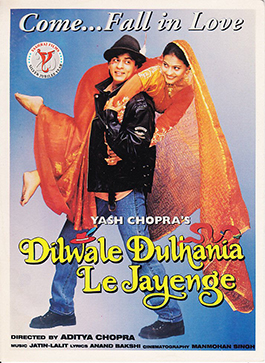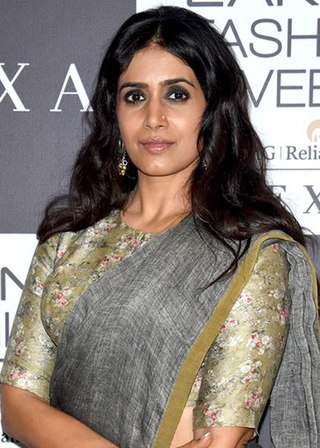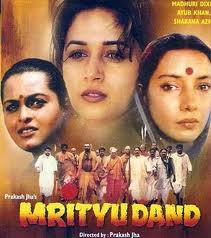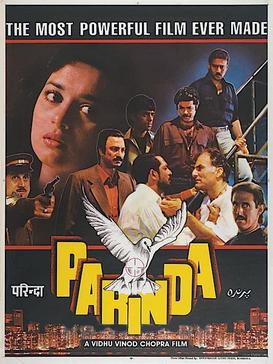
Dilwale Dulhania Le Jayenge, also known by the initialism DDLJ, is a 1995 Indian Hindi-language musical romance film written and directed by Aditya Chopra in his directorial debut and produced by his father Yash Chopra. Released on 20 October 1995, the film stars Shah Rukh Khan and Kajol as Raj and Simran, two young non-resident Indians, who fall in love during a vacation through Europe with their friends. Raj tries to win over Simran's family so the couple can marry, but Simran's father has long since promised her hand to his friend's son. The film was shot in India, London, and Switzerland, from September 1994 to August 1995.

Sonali Bendre Behl is an Indian actress who primarily works in Hindi and Telugu films. She did modelling assignments prior to making her acting debut with Aag (1994), which won her the Filmfare Award for New Face of the Year.

Vidhu Vinod Chopra is an Indian film director, producer, screenwriter and editor. He is the recipient of several accolades, including four National Film Awards and eleven Filmfare Awards. He is known for directing films such as the crime drama Parinda (1989), the patriotic romantic drama 1942: A Love Story (1994), the action drama Mission Kashmir (2000) and the biographical drama 12th Fail (2023). He is also known for producing the Munna Bhai film series, 3 Idiots (2009), PK (2014), and Sanju (2018) under his banner Vinod Chopra Films.

Anand (transl. Joy) is a 1971 Indian Hindi-language drama film co-written and directed by Hrishikesh Mukherjee, with dialogues written by Gulzar. It stars Rajesh Khanna in the lead role, with a supporting cast including Amitabh Bachchan, Sumita Sanyal, Ramesh Deo and Seema Deo.

Hrishikesh Mukherjee was an Indian film director, editor and writer. He is regarded as one of the greatest filmmakers of Indian cinema. Popularly known as Hrishi-da, he directed 42 films during his career spanning over four decades, and is named the pioneer of the 'middle cinema' of India. Renowned for his social films that reflected the changing middle-class ethos, Mukherjee "carved a middle path between the extravagance of mainstream cinema and the stark realism of art cinema".

Qayamat Se Qayamat Tak, also known by the initialism QSQT, is a 1988 Indian Hindi-language romantic musical film, directed by Mansoor Khan in his directorial debut, and written and produced by Nasir Hussain. The film stars Aamir Khan and Juhi Chawla in lead roles, making their acting debut. The film features music by Anand–Milind, with lyrics written by Majrooh Sultanpuri. Qayamat Se Qayamat Tak tells the story of two individuals and recounts their journey of falling in love, eloping, and the aftermath.

Sonali Kulkarni is an Indian actress, producer, and writer who primarily appears in Marathi and Hindi films. Kulkarni is considered as one of the highest-paid actresses in Marathi cinema, and is a recipient of several accolades including a National Film Award, four Filmfare Marathi Awards and four Maharashtra State Film Awards.

Anahat (Unhurt) is a 2003 Marathi film directed by Amol Palekar and starring Anant Nag, Sonali Bendre and Deepti Naval. Anahat won the Best Artistic Direction award at the World Film Festival of Bangkok, in 2003.

Mrityudand is an Indian Hindi drama film released in 1997. It was directed and produced by Prakash Jha and stars Madhuri Dixit, Shabana Azmi, Ayub Khan, Mohan Agashe and Om Puri.

Parinda (transl. Bird) is a 1989 Indian Hindi-language crime drama film directed, produced and distributed by Vidhu Vinod Chopra. The film stars Jackie Shroff, Anil Kapoor, Nana Patekar and Madhuri Dixit. The story and scenario were written by Chopra, while Shiv Kumar Subramaniam and Imtiyaz Husain wrote the screenplay and dialogues, respectively. R. D. Burman composed the music and Khurshid Hallauri wrote the lyrics. Binod Pradhan served as the film's cinematographer and Renu Saluja was its editor.

Anupama Chopra (née Chandra) is an Indian author, journalist and film critic who served as the festival director of the MAMI Mumbai Film Festival from 2015 to 2023. She is also the founder and editor of the digital platform Film Companion, which offers a curated look at cinema. She has written several books on Indian cinema and has been a film critic for NDTV, India Today, as well as the Hindustan Times. She also hosted a weekly film review show The Front Row With Anupama Chopra, on Star World. She won the 2000 National Film Award for Best Book on Cinema for her first book Sholay: The Making of a Classic. She presently critiques movies and interviews celebrities for Film Companion.
Quest is a 2006 bilingual English and Marathi Indian drama film directed by Amol Palekar, starring Mukta Barve, Rishi Deshpande, Mrinal Kulkarni in lead roles. The film is last part of the trilogy on sexuality, which includes Daayraa and Anahat. It is an urban story of a woman who discovers that her husband is homosexual. It was premiered at the Brisbane International Film Festival (BIFF) on 5 August 2006.

Nirmal Pandey was an Indian Bollywood actor who was known for his roles of Vikram Mallah in Shekhar Kapur's Bandit Queen (1994), and Dajjal in Television Series Hatim, for portraying a transvestite in Daayraa (1996) for which he won a Best Actor Valenti award in France, Train To Pakistan (1998) and Godmother (1999). He played the role of Kishan Bhatta in Malayalam language film Dubai (2001).
Shadow, The Dark Side of Truth, is a 2009 Hindi film directed by Rohit Nayyar, written by Bobby Khan and produced by Nasser Khan and Shamsad Alam. The film cast includes Nasser Khan, Milind Soman, Sonali Kulkarni, and Hrishitaa Bhatt.

Teesra Kaun? is a 1994 Hindi language comedy action thriller film directed by Partho Ghosh. It features Chunky Pandey, Mithun Chakraborty, Amol Palekar, Satish Shah, Rakesh Bedi. The film is a remake of the 1990 Malayalam film No.20 Madras Mail, directed by Joshiy and starring Mohanlal.
Timeri Murari is an Indian novelist, journalist, playwright and screenwriter. He is the author of fourteen published novels, including best-sellers The Taliban Cricket Club (2012) and Taj (2007), and has written extensively for Indian and international newspapers including The Guardian. He has also written the screenplay of the award-winning Hindi movie Daayraa (1997), which was voted one of the ten best films of 1997 by Time magazine. He adapted and directed it as a stage play, The Square Circle, at the Leicester Haymarket Theatre in November 1999, starring Parminder Nagra.













